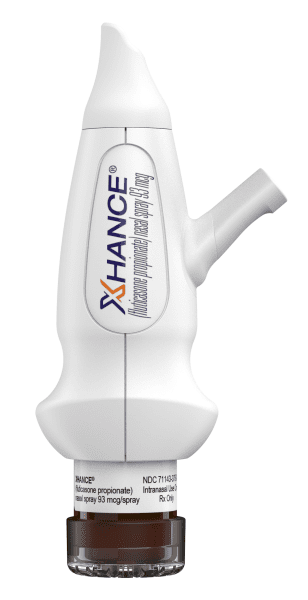Fluticasone Nasal Side Effects
Medically reviewed by Drugs.com. Last updated on Mar 31, 2025.
Applies to fluticasone nasal: nasal spray.
Precautions
It is very important that your doctor check your progress at regular visits to make sure this medicine is working properly and to check for unwanted effects.
If your symptoms do not improve within a few days or if they become worse, check with your doctor.
This medicine may cause holes or ulcers in the cartilage of the nose and delay wound healing. Make sure your doctor knows if you have had nose surgery, a nose injury, or an infection in your nose in the last few months before using this medicine.
Check with your doctor immediately if blurred vision, difficulty in reading, or any other change in vision occurs during or after treatment. Your doctor may want your eyes be checked by an ophthalmologist (eye doctor).
This medicine may cause serious allergic reactions, including anaphylaxis, which can be life-threatening and require immediate medical attention. Call your doctor right away if you have a rash, itching, hoarseness, trouble breathing, trouble swallowing, or any swelling of your hands, face, or mouth while you are using this medicine.
You may get infections more easily while using this medicine. Tell your doctor right away if you have been exposed to someone with chickenpox or measles. Also tell your doctor if you develop white patches or sores in your nose while you are using this medicine. This could be symptoms of a candida or yeast infection.
Using too much of this medicine or using it for a long time may increase your risk of having adrenal gland problems. Talk to your doctor right away if you have darkening of the skin, diarrhea, dizziness, fainting, loss of appetite, mental depression, nausea, skin rash, unusual tiredness or weakness, or vomiting.
This medicine may decrease bone mineral density when used for a long time. A low bone mineral density can cause weak bones or osteoporosis. Talk with your doctor if you have concerns about this.
This medicine may slow down a child's growth. If you think your child is not growing properly while using this medicine, talk with your doctor.
Do not take other medicines unless they have been discussed with your doctor. This includes prescription or nonprescription (over-the-counter [OTC]) medicines and herbal or vitamin supplements.
Serious side effects of fluticasone nasal
Along with its needed effects, fluticasone nasal may cause some unwanted effects. Although not all of these side effects may occur, if they do occur they may need medical attention.
Check with your doctor immediately if any of the following side effects occur while taking fluticasone nasal:
More common side effects
Less common side effects
- blurred vision
- change in vision
- loss of vision
Incidence not known
- difficulty with swallowing
- dizziness
- fast heartbeat
- large, hive-like swelling on the face, eyelids, lips, tongue, throat, hands, legs, feet, or sex organs
- puffiness or swelling of the eyelids or around the eyes, face, lips, or tongue
- redness of the skin
- skin rash, itching, hives or welts
Other side effects of fluticasone nasal
Some side effects of fluticasone nasal may occur that usually do not need medical attention. These side effects may go away during treatment as your body adjusts to the medicine. Also, your health care professional may be able to tell you about ways to prevent or reduce some of these side effects.
Check with your health care professional if any of the following side effects continue or are bothersome or if you have any questions about them:
Less common side effects
See also:
For healthcare professionals
Applies to fluticasone nasal: nasal spray.
General adverse events
The most commonly reported side effects were nasopharyngitis, epistaxis, and pyrexia.[Ref]
Nervous system
- Common (1% to 10%): Headache, unpleasant taste, unpleasant smell[Ref]
Gastrointestinal
- Common (1% to 10%): Toothache, nausea, diarrhea, abdominal distension, vomiting, gastrointestinal gaseous symptoms
- Frequency not reported: Gum signs and symptoms[Ref]
Hypersensitivity
- Very rare (less than 0.01%): Hypersensitivity reactions (including anaphylaxis, angioedema, rash, urticaria, bronchospasm)[Ref]
Ocular
- Common (1% to 10%): Conjunctivitis
- Very rare (less than 0.01%): Cataracts, glaucoma, raised intraocular pressure
- Frequency not reported: Transient ocular changes[Ref]
Immunologic
- Frequency not reported: Candida albicans infection, immunosuppression[Ref]
Respiratory
- Very common (10% or more): Nasopharyngitis (26%), epistaxis (20%)
- Common (1% to 10%): Pharyngolaryngeal pain, nasal ulceration, cough, pharyngitis, bronchitis, nasal dryness, throat irritation, throat dryness, blood in nasal mucosa, nasal irritation
- Uncommon (0.1% to 1%): Rhinalgia, nasal discomfort (including nasal burning, nasal soreness)
- Postmarketing reports: Nasal septal perforation[Ref]
Endocrine
- Frequency not reported: Hypothalamic-pituitary-adrenal (HPA) axis effects (including growth reduction)[Ref]
Musculoskeletal
- Common (1% to 10%): Back pain[Ref]
Other
- Very common (10% or more): Pyrexia
- Frequency not reported: Impaired wound healing[Ref]
References
1. (2001) "Product Information. Flonase (fluticasone)." Glaxo Wellcome
2. Cerner Multum, Inc. "UK Summary of Product Characteristics."
3. Cerner Multum, Inc. "Australian Product Information."
More about fluticasone nasal
- Check interactions
- Compare alternatives
- Pricing & coupons
- Reviews (349)
- Dosage information
- Patient tips
- During pregnancy
- Drug class: nasal steroids
Patient resources
Other brands
Flonase, Flonase Allergy Relief, Xhance, Flonase Sensimist, Veramyst
Professional resources
Other brands
Flonase, Xhance, Veramyst, Ticanase
Related treatment guides
Further information
Fluticasone nasal side effects can vary depending on the individual. Always consult your healthcare provider to ensure the information displayed on this page applies to your personal circumstances.
Note: Medication side effects may be underreported. If you are experiencing side effects that are not listed, submit a report to the FDA by following this guide.

